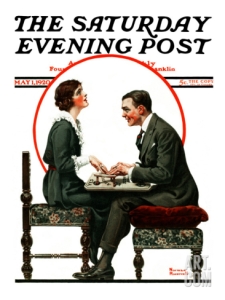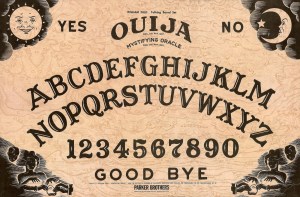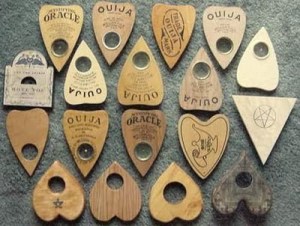There is probably not a person out there who either hasn’t themselves played with a talking board or at least known someone who has at some point in their lives. In fact, it almost seems like a rite of passage through our teenage years. I did it, I admit. But think about that very statement: “I admit.” It’s as though, by admitting we’ve played with this device, we’re shamefully confessing to doing something terribly wrong. I didn’t commit any crimes. I didn’t spend my evening shoplifting or doing drugs. I played with an Ouija board. It’s just a game…..right?
Talking boards have been with us for a very long time. They go back before the American Civil War, though they looked very different and were “operated” a little differently too. The Spiritualist movement brought them to the forefront of American culture and—if you can believe this—there was a time when nearly every household had one. Families sat around and “played” with them just as they’d sit down for a game of Monopoly or Scrabble today. Can you imagine walking in to a friend’s house tonight for dinner and there, on the sofa table, sits the board? Dear God, most of us would be out of there so fast our own heads would spin. I mean…better to get the heck out of there than be possessed by Pazuzu, after all.

Norman Rockwell famously depicted a couple playing with a Ouija on the cover of The Saturday Evening Post in 1920.
But where did that fracture happen in our culture? As late as the 1940s and 50s people had these boards out in the open and dabbled with spirit communication. Yet somewhere along the way we became convinced that to even lay a finger on the wretched device meant you were truly invoking the worst of Hell and inviting them up to your table for drinks. Is that really the case though?
Ouija (properly pronounced “wee-juh,” though now more commonly pronounced “wee-gee”) is a brand name for a particular type of talking board. In the 1890s businessman, toy-maker, and designer William Fuld and his brothers developed the board we are most familiar with. But it was his alleged psychic/medium sister who named it. She asked the board what it would like to be called and the rest is history. Contrary to popular belief it does not mean “Yes, Yes” in French and German. (Sorry folks. Besides, that doesn’t really make any sense anyway, if you think about it.) Instead, it means “Good luck.” (Ironically, this board and its development split the Fuld family in two and resulting in a nearly century-long family feud.) Though the term Ouija technically refers only to this board, we use it interchangeably to refer to all spirit talking boards.
So how did we go from a society that embraced the board as a mere parlor game to damning it as the gateway to all evil? According to foremost Ouija historian and researcher, Robert Murch, the Fuld family had asked the Roman Catholic Church how it felt about such a device and received its blessing upon the promise that the Fuld family would tithe a hefty sum from the board sales. When the funds ran out, so did the Church’s tolerance. (I’m not finger-pointing here, as I have no first-hand knowledge of this, but Murch has spent nearly 20 years researching all things Ouija. He’s the expert even the Fuld family decedents go to for insight on their history.) Now sprinkle a heavy dash of pop culture and Hollywood influence and—voila!—instant damnation.
But is the board truly evil?
The board is just a board and, like Karma, neither inherently good nor inherently bad. Experts suggest that the board is merely a reflection of what we bring to it. For example, according to psychologists, the board is manipulated by the players—possibly subconsciously—providing results that reflect the users’ intent. If you approach the board from a place of fear, they postulate, you will receive a fearful response. Those of us in the paranormal/spiritual world don’t usually discount this, but we also don’t rule out that spirit communication is possible too. (As a psychic and a medium, I assure you it is very possible. But don’t take my word for it—there are plenty of well-known psychic/mediums out there who make a lot more impact than I do and they are some very fascinating individuals.)
If you are a paranormal investigator, I’m willing to bet that one of the key pieces of equipment in your arsenal (regardless of how elaborate or modest) is a voice recording device of some kind. Having investigated for many years myself, I know one of the first questions that is ultimately asked at any location is quite simply: “Is there any one here who would like to speak with us?”
Now think about that for just a second. For those of us who have played with a talking board ourselves, or witnessed others playing with it, isn’t that very same (or at least similar) question asked? The point isn’t the semantics of the question; it is the demonstration that we first open the proverbial door to the ether without ever putting a safeguard in place. Consider it like opening your front door to a stranger without ever checking to see who it is. Maybe you open it up wide for anyone to walk through, or maybe you keep the screen door locked between you first until you can discern the reason for their visit. In this day and age, surely the latter choice is wiser. One should always check to see who is knocking, right? So why wouldn’t you put a safeguard in place before you start asking questions?
Some teams pray, ask for protection, or seal themselves in white light before going into a haunted location (not a bad idea at all!). Others just storm the gates as though nothing on the other side can affect them. (For more on the dangers of not protecting oneself, please refer back to the archives for topics on both protection and attachment removal.) If you plan to operate an EVP recorder, plan first to protect yourself, then next to ask specifically for the spirit you are seeking. Or at the very least—if no spirit is known, or no name is known—ask only that spirits of a very high vibration come through. Remember, the low vibration entities are not the ones you want to commune with, no matter the parlor tricks they may dazzle you with.
The same goes for the Ouija board (branded or not). If you want to use it, just make sure you are asking for protection first. Remember, too, the board is sort of like a phone. If you are receiving messages that are scary, negative, threatening, etc., simply state that you are not going to tolerate this and the communication is now done. Let them know they must go away and they are not welcome to come back. Ask for the protection of St. Michael the Archangel and your guides, as having some reinforcements in your camp can’t hurt.
Don’t enter a session with the intent to be scared. Fear is a low vibrational energy and I frequently use sharks as an analogy to attracting low vibrational energies. If you spend a lot of time in an ocean, you may or may not ever see a shark. But if you cut your arm and let it bleed into the water, one is bound to show up. The same is true with negative entities. If you don’t protect yourself and don’t take the spirit side seriously, one is bound to find you someday. (Note: this does not mean you’ll turn into a host for Pazuzu and your head will spin in circles. It just means any low vibrational energy can possibly attach itself to you and use your energetic field as a “meal.”)
Ouija boards have a long and colorful history. Some have even been blamed for crimes such as murder. (No joke, “the Ouija made me do it” has been an actual defense on more than one occasion.) Yet the board itself holds no power. It is merely another divination tool, a spiritual communicator, in the same sense EVP recorders and pendulums are. Be careful if you’re planning on using or having one at your Halloween party this year. Make sure you and your guests are fully aware that invoking low vibrational energies is not acceptable. (They’re easier to call up than to remove, so if you’re cool with a possible long-term tenant, ignore this warning.)
Next week: Ouija: Zozo, Zuzu, and Other Frightening Encounters
Also- follow me on Twitter @spiritspeaksb and, if you’re in the Rockford, IL area, check out www.HauntedRockford.com for upcoming paranormal events, tours, and investigations!
References:
Robert Murch, Ouija historian, researcher, and expert. http://robertmurch.com. See also: http://www.williamfuld.com/biography.html
Rosemary Ellen Guiley “Ouija Gone Wild” (paperback and Kindle versions available on Amazon.)

